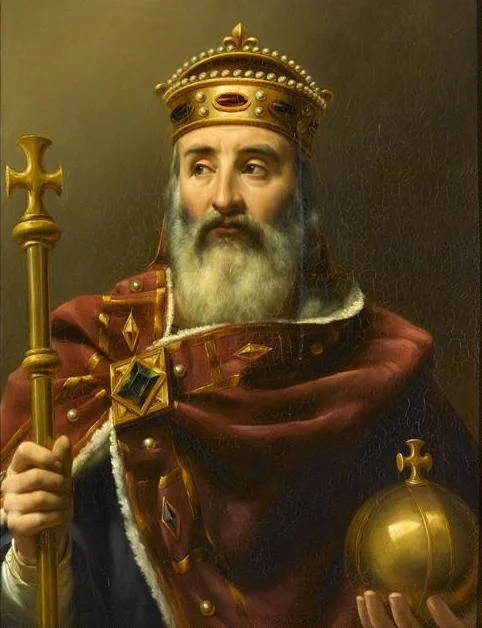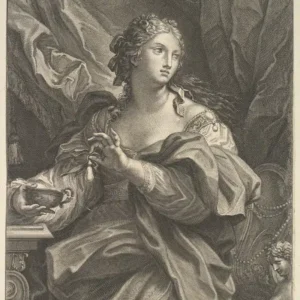Charlemagne, also known as Charles the Great, was one of the most influential rulers in medieval European history. Born on April 2, 742 (or 747), Charlemagne became the King of the Franks in 768 and later the Holy Roman Emperor in 800. His reign marked a period of significant expansion, cultural revival, and political consolidation that laid the foundation for modern Europe.
Early Life and Rise to Power
Birth and Background
Charlemagne was born to Pepin the Short, King of the Franks, and Bertrada of Laon. His exact birthplace is uncertain, but it is believed to be in Liege, present-day Belgium, or Aachen, Germany. From a young age, Charlemagne displayed exceptional intelligence and leadership qualities.
Ascending the Throne
In 768, Charlemagne and his brother Carloman inherited the Frankish kingdom after their father’s death. However, Carloman’s death in 771 left Charlemagne as the sole ruler of the Franks. He quickly set about consolidating his power and expanding his territory.
Military Campaigns and Conquests
Expansion of the Frankish Kingdom
Charlemagne embarked on numerous military campaigns to expand his kingdom. He conquered the Lombards in northern Italy in 774, the Avars in modern-day Austria and Hungary, and Bavaria. His most challenging campaign was against the Saxons, a Germanic tribe that resisted his rule for over 30 years. The conflict culminated in the Massacre of Verden in 782, where Charlemagne reportedly ordered the execution of 4,500 Saxons.
Coronation as Holy Roman Emperor
In 800, Pope Leo III crowned Charlemagne as the Holy Roman Emperor in Rome, marking the revival of the Roman Empire in the West. This coronation solidified Charlemagne’s authority and prestige, making him the first recognized emperor in the West since the fall of the Western Roman Empire.
Governance and Administration
Centralized Administration
Charlemagne implemented a centralized system of administration to govern his vast empire. He divided the empire into counties, each overseen by a count responsible for maintaining law and order, collecting taxes, and administering justice. This system helped ensure efficient governance and stability.
Legal Reforms
Charlemagne introduced several legal reforms to promote justice and order in his empire. He issued the Capitularies, a series of laws and decrees aimed at regulating various aspects of society, including the church, the military, and the economy. These reforms helped standardize laws and practices across the empire.
Cultural and Intellectual Revival
Carolingian Renaissance
Charlemagne’s reign is often associated with the Carolingian Renaissance, a period of cultural and intellectual revival in Europe. He promoted education and literacy, establishing schools and monastic libraries to preserve and disseminate knowledge. Charlemagne himself was an avid learner, proficient in Latin and knowledgeable about Greek and other languages.
Patronage of the Arts
Charlemagne was a great patron of the arts and architecture. He commissioned the construction of grand palaces, churches, and monasteries, many of which still stand today. His court attracted scholars, artists, and craftsmen from across Europe, fostering a vibrant cultural environment.
Legacy and Impact
Unification of Europe
Charlemagne’s conquests and administrative reforms played a crucial role in unifying Europe. His empire encompassed much of Western and Central Europe, laying the groundwork for the modern nations of France, Germany, Italy, and other countries. His efforts to spread Christianity and integrate diverse cultures helped shape the religious and cultural landscape of Europe.
Influence on Future Generations
Charlemagne’s legacy extended far beyond his lifetime. His reign inspired future leaders and rulers, including Napoleon Bonaparte and Adolf Hitler, who sought to emulate his vision of a unified Europe. The Holy Roman Empire, which Charlemagne founded, persisted for centuries, influencing the political and religious dynamics of Europe.
Conclusion
Charlemagne’s life and reign were marked by remarkable achievements and lasting impact. His military conquests, administrative reforms, and cultural patronage transformed Europe and laid the foundation for its future development. As the Father of Europe and Holy Roman Emperor, Charlemagne’s legacy continues to be celebrated and studied, reminding us of the enduring power of vision, leadership, and cultural revival.



